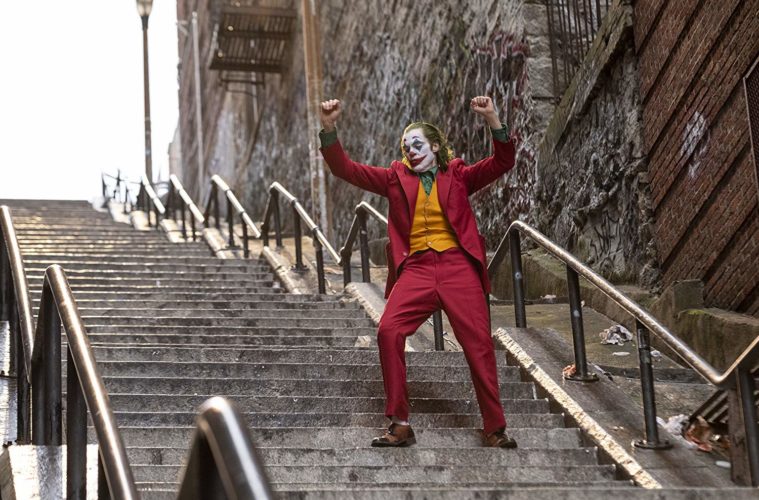A decade ago, when Todd Phillips was at the peak of his Hangover fame, the idea that one of his movies might become a leading Oscar nominee would have seemed like a joke. So it’s more than ironic that the director most closely identified with “the imperishable idiocy of the American male” made a bleak, artsy, psychological film up for 11 Academy Awards, including Best Picture. Joaquin Phoenix’s alienated standup comic says in Joker, “no one is laughing now” — except, perhaps, Warner Bros. executives and investors.
Joker, which portrays the DC Comics villain as a sympathetic sociopath in clown makeup, was Phillips’ hat tip to the gritty character films of the 1970s, and he was as surprised as anyone when it set off a cultural explosion. Since opening in October, the film has wowed audiences to the tune of $1 billion in global box-office receipts. (The 49-year-old director is now responsible for three of the top 10 biggest R-rated money-makers of all time, including The Hangover and The Hangover Part II.) We spoke with Phillips, also nominated for best director and adapted screenplay, about how it all came together.
L.A. WEEKLY: Let’s start with the fact that you made a comic book origin movie but threw out the handbook. One of the more interesting choices was to not include that scene we’ve watched a thousand times, where the villain falls into a vat of chemicals or something — the actual point where they switch into a bad guy. Was that something you and co-writer Scott Silver talked about from the start?
TODD PHILLIPS: When I first approached Scott about partnering on the script, the one thing I knew was that I wanted to run everything through as realistic a lens as possible. I wanted the film to take place in the real world so things like Joker falling into a vat of acid didn’t feel real to us. It was a lot of backwards engineering so to speak. Like, what do we know about Joker. He has that laugh, why? Where did that laugh come from? So we gave him a condition [the real-life involuntary laugh disorder known as pseudobulbar affect]. Why is his skin white and his hair green? What if that look is inspired by his day job? So we made him a clown-for-hire. Things like that.
I’m curious to know what kind of studio notes you got on this movie.
One of the benefits of doing a film like this at such a low budget ($55 million), relatively speaking, was that the studio really let us do our thing. Once they actually greenlit the picture, we had a lot of freedom. Honestly, I can’t remember any notes on the script where it was like “you can’t do that” or “you have to do this.” They took a bold swing on the film and they really let us take chances. In fact, they encouraged it.
How did they react to your director’s cut of the film?
When I showed them my cut, they literally had one note. And it was a good one. I was so in love with the score from our composer Hildur Guðnadóttir [also nominated] that I had used a lot more of it in that first cut. The studio note was, ‘maybe take a look at cutting some of the music down’; the thought being that when there is too much of it, it tends to lose its impact. Like I said, a solid note. Other than that, they had no notes on our cut. It was kind of amazing.
Dance was such a big part of Joaquin’s performance, which is favored to win the best actor award. Who inspired his character’s graceful movements?
Ray Bolger, Charlie Chaplin and Bill “Bojangles” Robinson, especially his famous step dance with Shirley Temple [in The Little Colonel]. All three inspired the dance.
I heard that the grimy outdoor staircase you used in the Bronx for the pivotal scene in which Joker celebrates his transformation is now a tourist attraction, along with “The Exorcist Stairs” in D.C. and “Rocky Steps” in Philly. Tell us about filming that day.
We shot the stair dance toward the end of our schedule. I think it was November 27 [2018], the Tuesday after our Thanksgiving break. It was a cold day in New York and we had three things to shoot that day, the stair dance being one of them. It was something that had always been in the script. In fact, Joaquin had worked for a few weeks in prep with our fantastic choreographer Michael Arnold on that dance. Joaquin and I were pretty nervous about that day because it was such a big moment in the film. I really just remember it going exceedingly well. We didn’t spend a ton of time on it, maybe two or three hours. But I remember driving home from set that day and feeling like it was going to be a pretty special moment.
I also heard somewhere that you’re no longer interested in making movies like The Hangover and Old School. Are you done with comedy?
I absolutely never said that.
Advertising disclosure: We may receive compensation for some of the links in our stories. Thank you for supporting LA Weekly and our advertisers.

